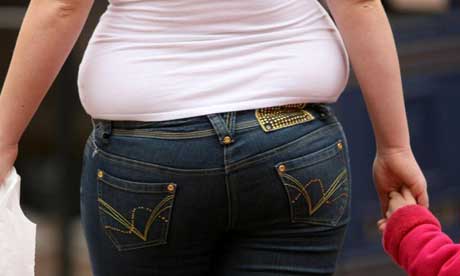
How fat is our nation? A doctor at a south of England hospital told me recently that in the paediatric unit waiting room they have finally admitted defeat and ordered the arms to be removed from the chairs because obese children and their obese parents were in danger of becoming stuck every time they sat down.
The doctor said, somewhat despairingly, that when he sees the overweight child, accompanied by the overweight mother and the overweight grandmother, he fears that he will make no significant impact on that young person's health. That they will, in their turn, grow up to be obese and will very likely suffer from the associated health problems, such as diabetes or heart disease. It was a very gloomy conversation.
Yet it is a conversation everybody agrees needs to be had. According to the government's own Foresight report, Tackling Obesities: Future Choices, almost nine in 10 adults and two-thirds of children will be overweight or obese by 2050 unless we do something now. The problem is what to do. "Smoking kills" is an easy message to get across. "Overeating kills" is more complex.
The latest tack taken by the Conservative party is of the finger-wagging variety. In Glasgow recently, Tory leader David Cameron said: "We talk about people being 'at risk of obesity' instead of talking about people who eat too much and take too little exercise."
The health secretary, Alan Johnson, takes the approach, currently trendy in Whitehall corridors, of libertarian paternalism - otherwise known as Nudge. This is the political concept that the nanny state does not work and that individuals should be free to make their own choices, but that sometimes they need the tools to help them make the right choice. In other words, a nudge along.
To this end, Johnson told a Fabian Society meeting last week that obese people must not be vilified, that lecturing them will not make them change their behaviour. Instead, obesity requires all of society to engage, to fight this battle, he said, describing a "broader partnership, not only with families, but with employers, retailers, the leisure industry, the media, local government and the voluntary sector".
This whole-society concept reflects the well-regarded Foresight report and Sir Derek Wanless's projections for the future health of the nation and how much it will cost the NHS in years to come - that is, it is not going to work only to say exercise more or eat five fruit and veg a day, because that is tinkering at the edges. Nor is it enough to say children should not eat so much junk.
You need, for instance, to change the planning laws so there are no fast-food outlets at the school gates. You need to ensure there are playing fields and access to sports facilities. You need "everyone, from the smallest community keep-fit class to the biggest retailers in the land" to join in, Johnson said.
All very admirable, said one obesity pressure group, but "what a pity he allowed his tummy to be tickled by Coca-Cola". On the very day Johnson made his Fabian Society speech, he announced that a coalition of companies - including Coca-Cola, Kellogg's and Nestlé - headed by the Advertising Association - had "pledged" more than £200m towards tackling obesity. Details, he added, were to be worked out.
The "£200m" claim needs to be treated with a serious pinch of low-sodium salt, since it suggests cash but is more vague. Air time, perhaps, or on-package messages - the value of which the companies make up themselves.
But, more importantly, how can a clear message be sent to children not to eat junk food by, er, the manufacturers of that junk food? Remember the fiasco over Cadbury's sports equipment campaign, during which it was revealed that each child would need to eat 5,440 chocolate bars before claiming a free football net?
This is an industry with form - an industry, let us not forget, that has failed to stop advertising junk food before the 9pm watershed, adequately reduce salt and sugar levels in cereals, and institute universal food labelling so the consumer knows how much fat, salt and sugar they are about to eat. It is hard to have confidence that its commitment to fighting obesity is little more than free publicity handed to it by the health secretary.
· Victoria Macdonald is social affairs correspondent for Channel 4 News.

